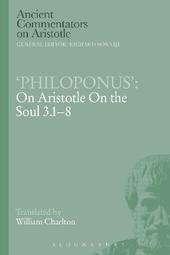
|
Philoponus': On Aristotle On the Soul 3.1-8
Paperback / softback
Main Details
| Title |
Philoponus': On Aristotle On the Soul 3.1-8
|
| Authors and Contributors |
By (author) W. Charlton
|
| Series | Ancient Commentators on Aristotle |
|---|
| Physical Properties |
| Format:Paperback / softback | | Pages:240 | | Dimensions(mm): Height 234,Width 156 |
|
| Category/Genre | Western philosophy - Ancient to c 500 |
|---|
| ISBN/Barcode |
9781472558497
|
| Classifications | Dewey:185 |
|---|
| Audience | | Postgraduate, Research & Scholarly | | Undergraduate | |
|---|
|
Publishing Details |
| Publisher |
Bloomsbury Publishing PLC
|
| Imprint |
Bloomsbury Academic
|
| Publication Date |
10 April 2014 |
| Publication Country |
United Kingdom
|
Description
In On the Soul 3.1-8, Aristotle first discusses the functions common to all five senses, such as self-awareness, and then moves on to Imagination and Intellect. This commentary on Aristotle's text has traditionally been ascribed to Philoponus, but William Charlton argues here that it should be ascribed to a later commentator, Stephanus. (The quotation marks used around his name indicate this disputed authorship.) 'Philoponus' reports the postulation of a special faculty for self-awareness, intended to preserve the unity of the person. He disagrees with 'Simplicius', the author of another commentary on On the Soul (also available in this series), by insisting that Imagination can apprehend things as true or false, and he disagrees with Aristotle by saying that we are not always free to imagine them otherwise than as they are. On Aristotle's Active Intellect. 'Philoponus' surveys different interpretations, but ascribes to Plutarch of Athens, and rejects, the view adopted by the real Philoponus in his commentary on Aristotle's On Intellect that we have innate intellectual knowledge from a previous existence. Instead he takes the view that the Active Intellect enables us to form concepts by abstraction through serving as a model of something already separate from matter. Our commentator further disagrees with the real Philoponus by denying the Idealistic view that Platonic forms are intellects. Charlton sees 'Philoponus' as the excellent teacher and expositor that Stephanus was said to be.
Author Biography
William Charlton was formerly Head of the Philosophy Department at the University of Edinburgh.
|